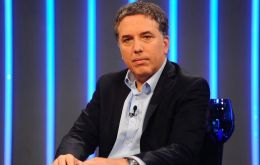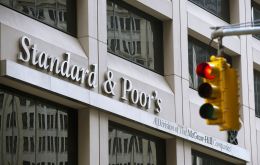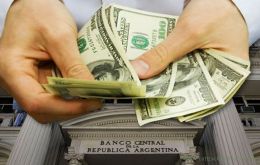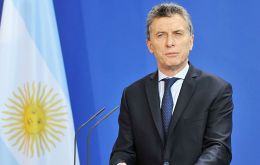MercoPress. South Atlantic News Agency
Tag: Nicolas Dujovne
-
Wednesday, September 5th 2018 - 07:30 UTC
Argentina/IMF discussions continue this Wednesday; strong support from Trump

Argentina “made progress” on Tuesday in talks with the International Monetary Fund aimed at securing an accelerated disbursement of a US$50 billion loan it hopes will calm its debilitating economic crisis.
-
Monday, September 3rd 2018 - 19:17 UTC
Macri admits the seriousness of the situation and Dujovne is off to meet with IMF

President Mauricio Macri unveiled plans on Monday to raise export taxes on grains and slash the number of government ministries in a bid to balance its budget next year, as Argentina seeks a deal with the IMF to accelerate a US$ 50 billion standby loan program.
-
Monday, September 3rd 2018 - 09:25 UTC
Argentina's efforts to regain confidence: cutting number of ministries and taxes on farm exports

Argentina is drafting plans to cut its budget deficit to convince nervous investors it can pay its debts and this Monday Finance minister Nicolas Dujovne is scheduled to announce measures, before traveling to Washington to meet with IMF's chief Christine Lagarde.
-
Saturday, September 1st 2018 - 09:27 UTC
S&P places Argentina credit ratings under review

S&P said on Friday it may lower Argentina's long-term foreign currency rating from its current B+ grade, which is four notches below investment grade -- and on par with Turkey, Greece and Fiji. The ratings company cited the risk of worsening creditworthiness and exchange rate volatility as potential threats to the economic adjustment measures undertaken by Mauricio Macri’s administration.
-
Saturday, September 1st 2018 - 07:46 UTC
IMF strong support helps stabilize Argentine Peso; Macri preparing new economic package

Argentina’s beleaguered peso stabilized on Friday as the central bank said it would auction a large amount of dollar reserves, and the International Monetary Fund (IMF) issued a strong statement of support for President Mauricio Macri’s government.
-
Thursday, August 30th 2018 - 09:11 UTC
Macri addresses the nation; IMF pledges more support but Peso falls 7%, a record 34 to the US dollar

Argentina's Peso suffered its biggest one-day slide in almost three years on Wednesday after the central bank sold reserves for a second straight day and the president asked the International Monetary Fund for early release of standby funds.
-
Wednesday, August 29th 2018 - 08:48 UTC
US dollar hits a new record in Argentina despite auctioning US$ 200 million

Argentina’s central bank auctioned a total of US$ 200 million of its reserves in two separate currency auctions on Tuesday after the peso hit new lows, the monetary authority said in a statement.
-
Tuesday, August 28th 2018 - 09:02 UTC
Argentine economy expected to contract 1% this year and rebound 1.5% in 2019

Argentina’s economy is expected to contract 1% in 2018, but grow by at least 1.5% next year, Minister Nicolas Dujovne told reporters on Monday. Dujovne said the government was maintaining its fiscal deficit target of 2.7% of GDP for full-year 2018. The government also expects a current account deficit of 3% of GDP in 2019, he said.
-
Monday, July 23rd 2018 - 07:15 UTC
Top grades for Macri and his reform policies from IMF's Lagarde

Christine Lagarde, Managing Director of the International Monetary Fund, met with Argentina’s President Mauricio Macri, Finance Minister Nicolas Dujovne and Central Bank Governor Luis Caputo in the context of the Group of 20 Finance Ministers and Central Bank Governors meeting in Buenos Aires over the weekend.
-
Friday, July 20th 2018 - 07:21 UTC
Argentina finances improving: half year primary deficit drops to 0.8% of GDP

Argentina posted a primary fiscal deficit of 105.8 billion pesos (US$3.7 billion), or 0.8% of gross domestic product (GDP) in the first half of 2018, government data showed on Thursday, down 26.7% from the same period last year.
